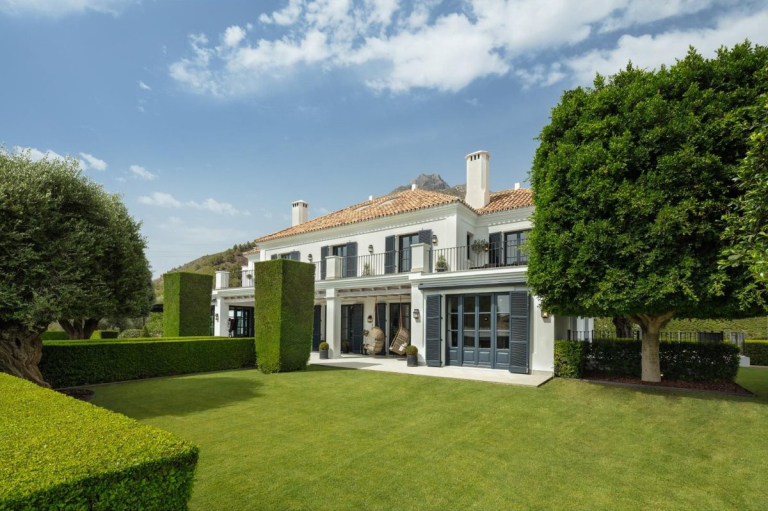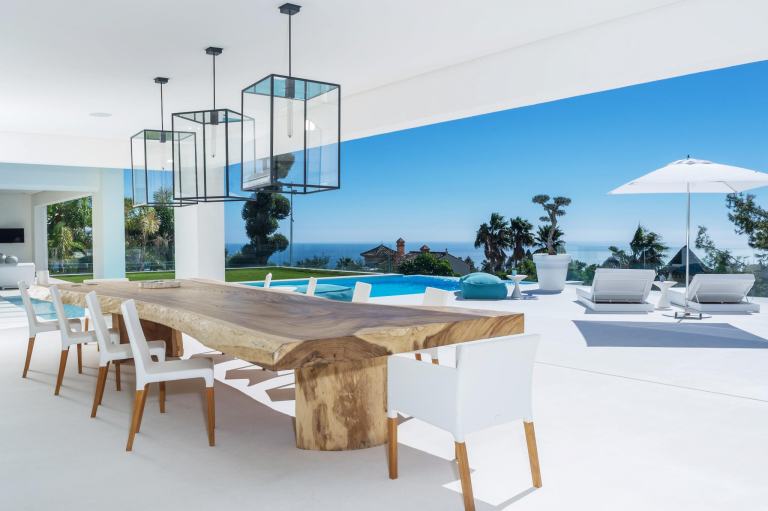Are you considering buying a house? I’d be happy to guide and advise you!
I help buyers find and purchase their home, and I support them throughout the entire buying process right up to the final transfer.
This service is completely free of charge for buyers!
Send me a message, and we’ll schedule a no-obligation appointment.

Existing property or new build property?
When buying a home, you’re faced with many decisions.
The first and perhaps the most important choice is: will you go for new build property or an existing property? Each option comes with its own pros and cons!
We’ve listed them for you below:
New construction
Advantages of new construction
Modern kitchens with the latest innovative built-in appliances.
Luxurious, contemporary bathrooms.
Heat and sound insulation that meets the latest building standards.
Advanced cooling and heating systems, fully up-to-date with modern regulations.
High-quality windows, door frames, and sliding doors built to current regulations.
Underfloor heating as standard (or available as an option).
More spacious rooms, larger terraces, and higher ceilings.
Possibility to buy a property up to 30% below market value.
Flexibility to customize finishes to your own taste.
Long-term warranties on construction and installations.
Large, threshold-free sliding glass doors for a seamless transition between indoor and outdoor spaces—often with matching flooring.
Access to exclusive facilities such as heated indoor pools, fitnesscenters, saunas, spas, co-working spaces, and sometimes even golf training areas
Stunning views.
Disadvantages of new construction
- Often a waiting period of a year or more before completion.
- Landscaping in the development is still young and needs time to mature.
- Locations can sometimes be farther out.
- Prices are usually non-negotiable.
- You need to be able to visualize what the home and view will look like, based on illustrations, floor plans, descriptions, and the site.
Existing properties
Advantages of existing properties
- Developments often feature beautiful, mature gardens.
- Buildings with unique character and history.
- Frequently located in prime areas.
- Asking prices are often negotiable.
- Opportunities for renovation and personal customization.
- What you see is what you get—no surprises.
- In most cases, you can move into your new home within 6 to 12 weeks.
Disadvantages of existing properties
Sometimes poor insulation and heating.
Outdated features that may require renovation, both inside and out.
Smaller living and bedroom spaces compared to new construction.
Kitchens and bathrooms may be outdated.
Additional time and effort needed for renovations.
What a Buying Agent Does
Our services as a buying Agent
💡 Our service is completely free of charge for the buyer!
1. Needs analysis
Discuss your wishes, budget, and requirements.
Provide advice on suitable areas.
2. Property search & viewings
Select and present properties that meet your criteria.
Schedule and guide you through viewings.
3. Negotiations
Negotiate the price and terms.
Fully represent and protect your interests.
4. Legal support
Recommend and work with a (real estate) lawyer.
5. Financial guidance
If desired, connect you with a mortgage advisor.
6. After-sales service
Even after the handover of your property, we continue to support you:
Maintenance and renovations
Interior design & styling
Cleaning services
Garden maintenance
Rental services
Additionally, we are happy to connect you with:
A insurance agency
The best internetprovider
The Buying Process in 5 Steps
Below is an overview of the 5 most common steps involved in purchasing a property.
1. Research and preparation
Financial planning: Determine your budget, including additional costs, which typically amount to 10–15% of the purchase price.
Mortgage: If you need a mortgage, it’s wise to explore your financing options early. Approval can take 4 to 8 weeks, and not all sellers are willing to wait. We can connect you directly with banks and/or mortgage advisors.
Lawyer: Engage a specialized real estate lawyer early in the process to assist with the legal aspects of your purchase. We can introduce you to a trusted property lawyer.
NIE Number: Your lawyer can help apply for an NIE number (Número de Identificación de Extranjero) — a personal ID number required for nearly all official and financial matters in Spain.
Bank account: Opening a Spanish bank account is essential when purchasing property in Spain.
2. Reservation Agreement (Contrato de Reserva)
Once you’ve found your ideal property, it’s important to act quickly and sign the reservation agreement to secure it before other interested buyers do.
Key aspects:
Purpose: Takes the property off the market, reserving it while the buyer arranges financing and legal due diligence.
Deposit: Typically 1% of the purchase price, with a minimum of €6,000 depending on the value of the property.
Refundability: In most cases, non-refundable if the buyer withdraws without a valid reason. The deposit is deducted from the final purchase price.
Duration: The reservation period usually lasts 15 to 30 days.
Next step: Once everything checks out, a preliminary purchase agreement (Contrato de Arras) is prepared.
3. Preliminary Purchase Agreement / Deposit Contract (Contrato de Arras)
Key aspects:
Purpose: A pre-contract confirming the buyer’s and seller’s intention to complete the sale under agreed conditions.
Contents: Includes basic information such as the price, deadline for signing the final contract, and agreed terms.
Deposit (Arras): Typically 10% of the purchase price.
Limited binding effect
Cancellation terms: Either party may withdraw. If the buyer cancels, they lose the deposit. If the seller cancels, they must repay double the amount.
Duration: Sets a deadline for completing the purchase, usually within 30 to 60 days.
4. Final Purchase Agreement (Contrato de Compraventa)
Key aspects:
Purpose: This is the binding agreement that legally formalizes the transfer of ownership.
Contents: Includes all legal details such as transfer of title, payments, taxes, and obligations.
Fully Binding: This contract obligates both parties to complete the transaction. It can be drawn up with or without a notary, although notarial involvement is standard in Spain.
5. Notarial Transfer (Escritura de Compraventa)
Key aspects:
Purpose: The official deed of sale that confirms the legal transfer of ownership from the seller to the buyer.
Legal validity: This document is required to make the transfer of ownership legally binding.
Signing at the notary: Both the buyer and seller (or their legal representatives) must be present at the signing.
Payment: The buyer must pay the remaining balance of the purchase price on this day, along with any applicable taxes and fees.
Land registry: After signing, the deed must be registered at the Registro de la Propiedad (Spanish Land Registry) to officially record the buyer as the new owner. This process may take several weeks.
What a Lawyer does
A lawyer plays an essential role in the home-buying process.
In Spain the notary only records the sale.The responsibility for due diligence lies with the buyer.
This means you must ensure there are no outstanding debts on the property, that all (rental) licenses are in order, and that the land registry is accurate.
A good lawyer is absolutely essential to check all legal aspects before you sign anything, helping to avoid unpleasant surprises.
Key tasks of a lawyer in the property purchase process:
1. Legal document review
Purchase Agreement: The lawyer verifies that the agreement is legally sound and complete, including checking for any clauses that may be unfavorable to the buyer.
Title deed: The lawyer confirms that the seller is the legal owner of the property and that there are no liens, mortgages, or legal obstacles that could prevent the sale.
Land registry check: The lawyer checks the property registration in the Registro de la Propiedad to confirm ownership status and any burdens on the property.
Power of Attorney: We recommend granting your lawyer full power of attorney to represent you efficiently.
2. Negotiations
The lawyer can negotiate on your behalf regarding contract terms, handover dates, and any contingencies.
3. Legal Advice
Legal implications: The lawyer advises on all legal consequences of the purchase, including risks and obligations.
Tax considerations: In some cases, the lawyer may also provide guidance on tax aspects, such as property transfer tax or VAT.
4. Financing & guarantees
Mortgage documents: If financing is needed, the lawyer reviews the mortgage agreement and advises on the conditions.
Security deposit: The lawyer ensures that any deposit or bank guarantee is handled correctly.
5. Completion of the Transaction
Deed signing at the notary: In Spain, the final property transfer is signed in front of a notary. The lawyer supervises and verifies the entire process.
Title deed & key handover: The lawyer ensures the deed is properly drafted and that the property is legally transferred to the buyer.
6. Post-Purchase Services
The lawyer will assist in transferring utilities such as water, electricity, alarm systems, and community association membership (HOA) into your name.
The lawyer also arranges payment of property transfer tax on your behalf.
7. Resolving Disputes
- If any disputes arise during or after the purchase, such as hidden defects or breach of contract, your lawyer can provide legal assistance or take legal action on your behalf.
Costs and Taxes for the Buyer
In the Costa del Sol region, the additional costs when purchasing a property typically range from 10% to 13% of the purchase price.
Below is an overview of the most common costs:
1.Transfer Tax (ITP) or VAT (IVA)
Of existing properties: usually 7% (fixed rate in Andalusia since 2021).
For new build properties: 10% VAT (IVA) plus stamp duty of 1.2%.
2.Notary fees
Notary fees depend on the value of the property and are usually between 0.5% and 1% of the purchase price.
3.Land registry fees
The cost for registering the property in the land registry is approximately €400 to €800.
4.Lawyer fees
It is recommended to hire a lawyer to guide you through the process. The costs are usually around 1% of the purchase price.
5.Mortgage fees (If applicable)
Appraisal, registration, and bank fees together amount to 1%-3% of the mortgage amount.
6.Real estate agent fees
These are paid by the seller in Spain.
7.Other costs
Municipal taxes: A settlement of annual taxes, such as the IBI (property tax) and Basura (waste tax).
Community Fees (VVE): A settlement of annual costs.

